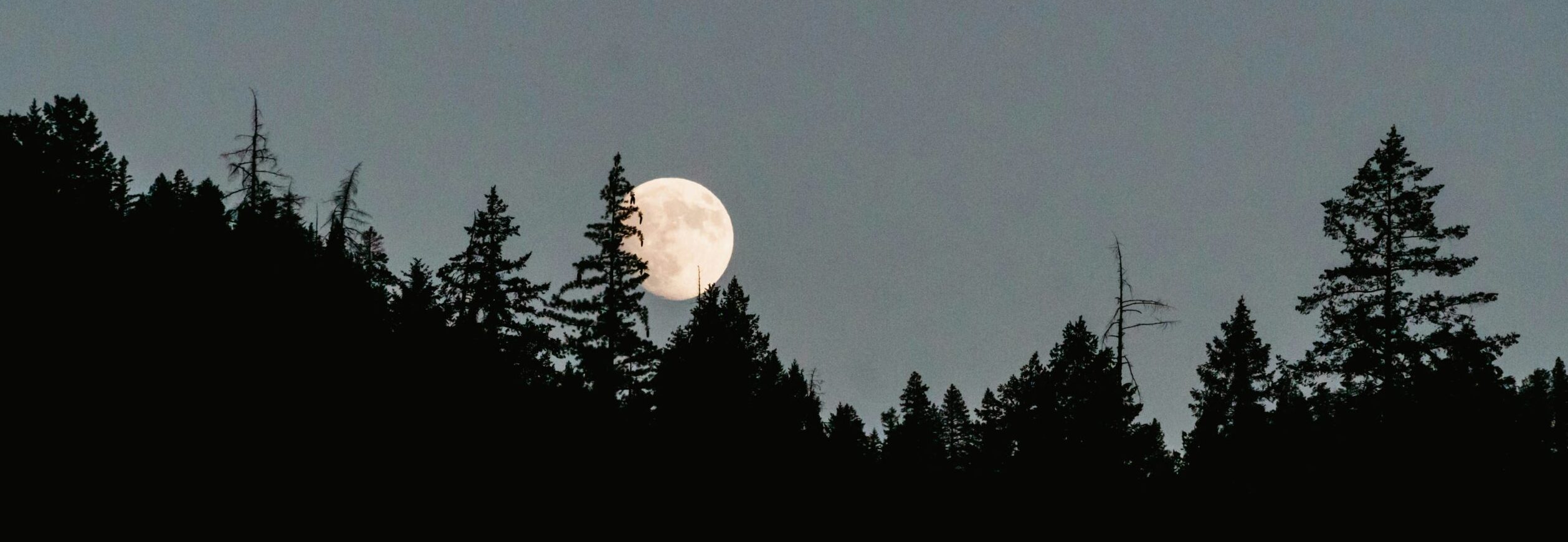Below is a quick-and-dirty guide to the full moons of the year. These moon names come from a tangle of folk traditions, colonial almanacs, and Indigenous seasonal wisdom. Many faeries use them to guide intention-setting, rituals, and reflection. Where possible, we’ve included the traditional names used by Native American tribes – ensuring we remember that many of these names are rooted in relationship with land, season, and survival. Each full moon holds a tone, a teaching, and an invitation.
January
Folk Name: Wolf Moon
Indigenous Name: Cold Moon (Mohawk), Spirit Moon (Ojibwe)
Themes: howling, hunger, protection, solitude, survival, endurance, deep winter
February
Folk Name: Snow Moon
Indigenous Name: Bear Moon (Ojibwe), Eagle Moon (Cree), Hunger Moon (varied)
Themes: stillness, purification, scarcity, patience, dreams, cleansing, inner focus
March
Folk Name: Worm Moon
Indigenous Name: Crow Moon (Ojibwe), Wind Strong Moon (Pueblo), Sap Moon (Algonquin)
Themes: thaw, emergence, movement, bravery, returning light, early growth, soil awakening
April
Folk Name: Pink Moon
Indigenous Name: Breaking Ice Moon (Algonquin), Frog Moon (Cree), Budding Moon (Tlingit)
Themes: blossoming, beauty, emotional opening, flirtation, vulnerability, creativity
May
Folk Name: Flower Moon
Indigenous Name: Planting Moon (Dakota), Leaf Budding Moon (Cree), Corn Planting Moon (Hopi)
Themes: fertility, bloom, sensuality, abundance, enchantment, wild joy
June
Folk Name: Strawberry Moon
Indigenous Name: Blooming Moon (Anishinaabe), Green Corn Moon (Cherokee), Hot Moon (Hopi)
Themes: sweetness, ripening, nourishment, romance, color, connection, offering
July
Folk Name: Buck Moon
Indigenous Name: Thunder Moon (Ojibwe), Raspberry Moon (Algonquin), Salmon Moon (Tlingit)
Themes: vitality, sovereignty, wildness, growth, strength, instinct, rising power
August
Folk Name: Corn Moon
Indigenous Name: Wild Rice Moon (Ojibwe), Harvest Moon (varies), Mountain Shadow Moon (Zuni)
Themes: harvest, balance, preparation, tending, preservation, gratitude
September
Folk Name: Harvest Moon (closest full moon to the Fall Equinox)
Indigenous Name: Falling Leaves Moon (Ojibwe), Singing Moon (Haida), Corn Moon (Cherokee)
Themes: completion, cycles, ancestral connection, generosity, sacred work
October
Folk Name: Hunter’s Moon
Indigenous Name: Migrating Moon (Cree), Blood Moon (varied), Freezing Moon (Ojibwe)
Themes: precision, shadow work, letting go, death rites, clarity, threshold walking
November
Folk Name: Frost Moon
Indigenous Name: Freezing River Moon (Dakota), Trading Moon (Apache), Whitefish Moon (Anishinaabe)
Themes: descent, grief, slowing down, memory, silence, sacred dark
December
Folk Name: Cold Moon
Indigenous Name: Long Night Moon (Mohawk), Snow Exploding Trees Moon (Cree), Tree Cracking Moon (Dakota)
Themes: reflection, closure, hibernation, visioning, crystalline clarity, winter magic
Blue Moon
A Blue Moon is the second full moon in a single calendar month, an uncommon occurrence that intensifies energy and often marks heightened emotion, unexpected shifts, and magical amplification. Some see it as a time for rare rituals, truth-telling, and breaking patterns. Others treat it as a wild card or window of transformation.
